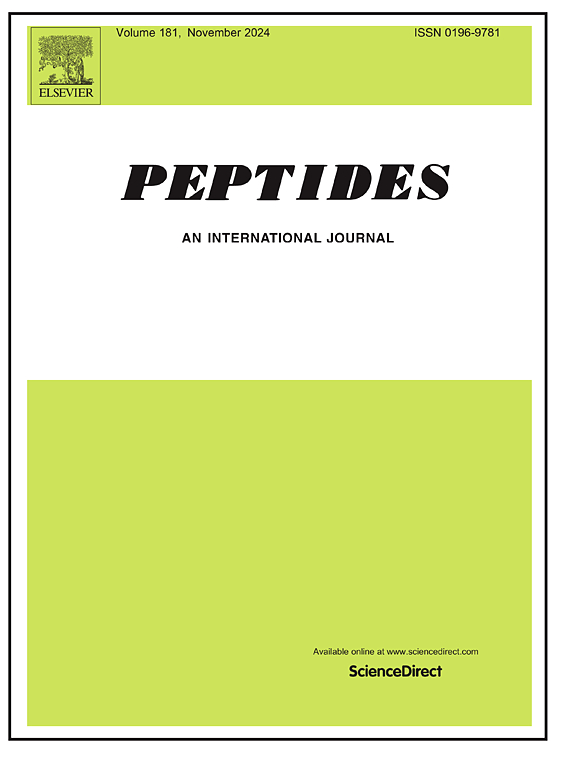伴有和不伴有射血分数降低的心力衰竭患者的前胆囊收缩素、胆囊收缩素和胃泌素的经心梯度
IF 2.9
4区 医学
Q3 BIOCHEMISTRY & MOLECULAR BIOLOGY
引用次数: 0
摘要
背景:胆囊收缩素(CCK)是肠道对食物摄入的反应。我们之前报道过CCK基因也在哺乳动物心脏中表达,并假设proCCK可能是一种新的心脏生物标志物。然而,尚不清楚心脏基因表达是否导致人类分泌。目的:探讨心衰伴射血分数降低(HFrEF)或心律失常患者心肌proCCK的分泌情况。方法:共纳入115例接受有创伤心脏手术的患者:55例HFrEF(67岁[四分位间距(IQR) 60-76], 72%男性,LVEF 30% [IQR 20-35]), 60例无HFrEF(26例沃尔夫-帕金森-怀特综合征(WPW)(30岁[IQR 26-39], 61.5%男性),34例心房颤动(AFIB)(66岁[IQR 60-71], 61.8%男性)。取冠状窦(CS)、左心房或股动脉(A)血,测定经心浓度梯度(TCproCCK) (CS proCCK浓度- A proCCK浓度)。放射免疫测定法用于测定血浆激素。结果:衰竭心脏的TCproCCK为0.05 pmol/l (IQR: -1.49 ~ 2.67) (p = 0.365)。在非衰竭心脏中,WPW的TCproCCK为0.35 pmol/l (IQR: -1.57至1.29)(p = 0.778), AFIB的TCproCCK为0.68 pmol/l (IQR: -1.58至3.28)(p = 0.133)。观察各组n端前b型利钠肽(NT-proBNP)的经心梯度。结论:没有证据表明在衰竭或结构正常的心脏中发现proCCK的净心肌分泌,质疑其作为心脏生物标志物的作用。本文章由计算机程序翻译,如有差异,请以英文原文为准。
Transcardiac gradients of pro-cholecystokinin, cholecystokinin, and gastrin in patients with and without heart failure with reduced ejection fraction
Background
Cholecystokinin (CCK) is secreted from the intestines in response to food intake. We previously reported that the CCK gene is also expressed in the mammalian heart, and it has been hypothesized that proCCK could be a novel cardiac biomarker. However, it is not known whether cardiac gene expression leads to secretion in humans.
Purpose
To investigate myocardial secretion of proCCK in patients with heart failure with reduced ejection fraction (HFrEF) or arrythmias.
Methods
A total of 115 patients undergoing invasive cardiac procedures were included: 55 with HFrEF (67 years [interquartile range (IQR) 60–76], 72.7 % male, LVEF 30 % [IQR 20–35]), and 60 without HFrEF (26 with Wolff-Parkinson-White syndrome (WPW) (30 years [IQR 26–39], 61.5 % male), and 34 with atrial fibrillation (AFIB) (66 years [IQR 60–71], 61.8 % male)). Blood was collected from the coronary sinus (CS) as well as the left atrium or femoral artery (A) to determine the transcardiac concentration gradient (TCproCCK) (CS proCCK concentration - A proCCK concentration). Radioimmunoassays were used for measurements of plasma hormones.
Results
TCproCCK across failing hearts was 0.05 pmol/l (IQR: −1.49–2.67) (p = 0.365). In non-failing hearts, TCproCCK was 0.35 pmol/l (IQR: −1.57–1.29) (p = 0.778) for WPW and 0.68 pmol/l (IQR: −1.58–3.28) (p = 0.133) for AFIB. Transcardiac gradients for N-terminal pro B-type natriuretic peptide (NT-proBNP) were observed in all groups.
Conclusions
No evidence of net myocardial secretion of proCCK was found in either failing or structurally normal hearts, questioning its proposed role as a cardiac biomarker.
求助全文
通过发布文献求助,成功后即可免费获取论文全文。
去求助
来源期刊

Peptides
医学-生化与分子生物学
CiteScore
6.40
自引率
6.70%
发文量
130
审稿时长
28 days
期刊介绍:
Peptides is an international journal presenting original contributions on the biochemistry, physiology and pharmacology of biological active peptides, as well as their functions that relate to gastroenterology, endocrinology, and behavioral effects.
Peptides emphasizes all aspects of high profile peptide research in mammals and non-mammalian vertebrates. Special consideration can be given to plants and invertebrates. Submission of articles with clinical relevance is particularly encouraged.
 求助内容:
求助内容: 应助结果提醒方式:
应助结果提醒方式:


